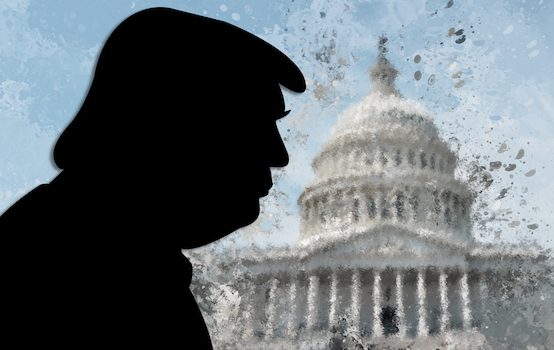Does Congress Have the Guts to Invoke War Powers?

The U.S. military has been engaged in hostilities overseas continuously in at least one country for almost sixteen years and has been fighting in multiple countries for most of that time, but the last time Congress voted for an authorization for the use of military force (AUMF) was in the fall of 2002 prior to the invasion of Iraq.
Since then, the U.S. has started or participated in new military campaigns in Libya, Iraq, Syria, and Yemen without Congressional authorization or debate, and most of these campaigns that began under President Obama continue to this day. Earlier this year, President Trump also ordered a cruise missile attack on Syrian government forces without U.N. or Congressional authorization, and the administration has yet to provide any arguments that the attack on the Syrian government was legally justified.
Our government’s unauthorized, illegal warfare has become practically routine over the last decade and a half, but there are now some encouraging signs of resistance in Congress to this destructive, unconstitutional habit.
U.S. support for and participation in the Saudi-led coalition’s war on Yemen since March 2015 may be the most obnoxious example of our government’s involvement in a foreign war without Congressional approval. Congress has never voted to authorize military support for this conflict, but U.S. refueling and arms sales have been essential to enabling the coalition campaign that has devastated this impoverished country in the southern Arabian Peninsula.
There is now an effort in the House of Representatives headed by Democratic Reps. Ro Khanna (Calif.) and Mark Pocan (Wis.) and Republican Reps. Walter Jones (N.C.) and Thomas Massie (KY) to cut off that support. Their resolution, H. Con. Res. 81, calls on the president to remove all U.S. forces from having any role in the campaign against the Houthi/Saleh alliance in Yemen under the terms of the War Powers Resolution of 1973.
In addition to being an overdue challenge to a terrible policy that has contributed to the world’s worst humanitarian crisis, this resolution would have offered House members the first opportunity to reassert their rightful role in matters of war that any of them have had in at least fifteen years. It is unfortunate that it has taken a policy as indefensible as our government’s policy in Yemen to prompt such action, but there is no war that deserves broad bipartisan opposition than this one.
Regrettably, the House leadership stripped the resolution of its privileged status earlier this week. Jason Ditz reports:
November 1 rolled around, however, and House leadership quickly forced through a Rules Committee vote which changed the rules on H.Con.Res. 81, stripping it of its privileged status (which would have guaranteed a floor vote). Though the War Powers Act guarantees such a resolution privilege, the Rules Committee claimed Yemen doesn’t rise to the level of the War Powers Act applying.
While the war on Yemen may be the occasion for renewed interest in debating war powers in Congress, it is not the only reason that members of Congress are challenging executive overreach. The possibility of another U.S.-led preventive war that could result in a nuclear exchange has focused the minds of many in Washington. As we all know, tensions between North Korea and the U.S. have grown worse over the last six months following North Korean nuclear weapons and missile tests. The president’s habit of issuing alarming threats of military action against North Korea in response to those tests has worried some members of Congress enough that they are drafting resolutions that forbid the president from ordering an attack without Congress’ express approval.
Uri Friedman reports on the measure being that will be put forward in the Senate:
And on Wednesday, amid a similar legislative push in the House, Chris Murphy announced that he and two other Democratic senators, Brian Schatz and Cory Booker, will be introducing legislation next week to prohibit the president from taking military action against North Korea—whether nuclear or non-nuclear—without congressional authorization. The prohibition wouldn’t apply if the United States is under attack or facing an imminent attack.
It was not so long ago that it would have been unremarkable for members of Congress to insist that the president obtain their approval before initiating a major war. Today Americans have become so used to accepting that presidents start wars on their authority that a resolution that tells the president to respect the Constitution seems radical and unfamiliar. The enormous costs of a war with North Korea should make it obvious why Congress should be the one to decide the question, and as a simple matter of democratic accountability all of our representatives should be forced to declare their position on something so significant.
These resolutions may not have majority support yet. We already know that House leaders won’t even allow one of them to come to a vote. Even if they did pass, the president could ignore them and dare Congress to do something about it. Nonetheless, these protests against current and possible future illegal wars show that some of our representatives haven’t forgotten their responsibilities and keep trying to rein in the executive. Everyone interested in a more restrained, peaceful, and just foreign policy should applaud and support their efforts.
Daniel Larison is a senior editor at TAC, where he also keeps a solo blog. He has been published in the New York Times Book Review, Dallas Morning News, Orthodox Life, Front Porch Republic, The American Scene, Culture11, and The Week. He holds a PhD in history from the University of Chicago, and resides in Lancaster, PA. Follow him on Twitter.
Comments